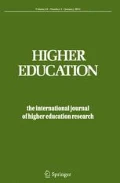Abstract
Curriculum innovation can hardly be successful unless teachers'conceptions and beliefs about teaching and learning are taken into account.In this article, a craft knowledge perspective is adopted which relatesteachers' conceptions and beliefs to their teaching practice, acknowledgingcontextual and cultural aspects of this practice. A study is described intothe craft knowledge of teachers of first-year courses in higher engineeringeducation, involved in a curriculum innovation project. The study revealedthe teachers' strong commitment to student learning. At the same time,misconceptions about a student-centered teaching approach were identified.The results of the study seriously affected the course of the innovationproject. On the one hand, adjustments of the innovation plans were deemednecessary in order to acknowledge teachers' motivation and dedication. Onthe other hand, the study provided a basis for the design of specificinterventions aimed at developing teachers' conceptions. It is argued thatcraft knowledge studies may constitute an important factor in successfulcurriculum innovation.
Similar content being viewed by others
References
Brickhouse, N.W. (1990). 'Teachers' beliefs about the nature of science and their relationships to classroom practice',Journal of Teacher Education41, 53–62.
Carlgren, I. and Lindblad, S. (1991). 'On teachers' practical reasoning and professional knowledge: Considering conceptions of context in teachers' thinking',Teaching & Teacher Education7, 507–516.
Carter, K. (1990). 'Teachers' knowledge and learning to teach', in Houston, W.R. (ed.),Handbook of Research on Teacher Education, pp. 291–310, New York: Macmillan.
Donald, J.G. (1992). 'Professors' and students' conceptualizations of the learning task in engineering courses',European Journal of Engineering Education17, 229–245.
Doyle, W. (1990). 'Themes in teacher education research', in Houston, W.R. (ed.),Handbook of Research on Teacher Education, pp. 3–24, New York: Macmillan.
Duffee, L. and Aikenhead, G. (1992). 'Curriculum change, student evaluation, and teacher practical knowledge',Science Education76, 493–506.
Dunkin, M.J. and Precians, R.P. (1992). 'Award-winning university teachers' concepts of teaching',Higher Education24, 483–502.
Grimmett, P.P. and MacKinnon, A.M. (1992). 'Craft knowledge and the education of teachers', in Grant, G. (ed.),Review of Research in Education (Vol. 18), pp. 385–456, Washington: AERA.
Harnish, D. and Wild, L.A. (1994). 'Mentoring strategies for faculty development',Studies in Higher Education19, 191–201.
Janesick, V.J. (1994). 'The dance of qualitative research design', in Denzin, N.K., and Lincoln, Y.S. (eds.),Handbook of Qualitative Research, pp. 209–219, Thousand Oaks: Sage.
Lantz, O. and Kass, H. (1987). 'Chemistry teachers' functional paradigms',Science Education71, 117–134.
Merton, R.K., Fiske, M. and Kendall, P.L. (1990). The Focused Interview: A Manual of Problems and Procedures.New York: The Free Press/London: Collier Macmillan.
Nixon, J. (1996). 'Professional identity and the restructuring of higher education',Studies in Higher Education21, 5–16.
Pajares, M.F. (1992). 'Teachers' beliefs and educational research: Cleaning up a messy construct',Review of Educational Research62, 307–332.
Parker, L.S. (1990). 'A prototypic human resource model', in Burke, P., Heideman, R. and Heideman, C. (eds.),Programming for staff development: Fanning the flame, pp. 87–116, London: The Falmer Press.
Samuelowicz, K. and Bain, J.D. (1992). 'Conceptions of teaching held by academic teachers',Higher Education 24, 93–111.
Schratz, M. (1992). 'Researching while teaching: An action research approach in higher education',Studies in Higher Education 17, 81–95.
Smith, J.A. (1995). 'Semi-structured Interviewing and Qualitative Analysis', in Smith, J.A., Harré, R. and Van Langenhove, L. (eds.),Rethinking Methods in Psychology, pp. 9–26, Thousand Oaks: Sage.
Tobin, K. and Dawson, G. (1992). 'Constraints to curriculum reform: Teachers and the myths of schooling',Education Technology Research & Development40, 81–92. Trigwell, K., Prosser, M. and Taylor, P. (1994). 'Qualitative differences in approaches to teaching first year university science',Higher Education27, 75–84.
Van Driel, J.H. (1993). 'How to turn teachers into facilitators of learning processes', in De Graaff, E. and Bouhuijs, P.A.J. (eds.),Implementation of Problem-based Learning in Higher Education, pp. 41–48, Amsterdam: Thesis.
Verloop, N. (1992). 'Praktijkkennis van docenten: een blinde vlek van de onderwijskunde' [Craft knowledge of teachers: A blind spot in educational research],Pedagogische Studiën69, 410–423.
Vermunt, J.D. (1995). 'Process-oriented instruction in learning and thinking strategies',European Journal of Psychology of Education10, 325–349.
Author information
Authors and Affiliations
Rights and permissions
About this article
Cite this article
van Driel, J.H., Verloop, N., Inge van Werven, H. et al. Teachers' craft knowledge and curriculum innovation in higher engineering education. Higher Education 34, 105–122 (1997). https://doi.org/10.1023/A:1003063317210
Issue Date:
DOI: https://doi.org/10.1023/A:1003063317210




